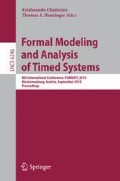Abstract
Unambiguous languages (UL), originally defined by Schutzenberger using unambiguous polynomials, are a robust subclass of regular languages. They have many diverse characterizations: they are recognized by partially-ordered two-way deterministic automata (po2dfa), they are definable by Unary Temporal Logic (UTL) as also by the two variable first-order logic over words ( FO 2[<]).
In this paper, we consider the timed version of unambiguous languages. A subclass of the two-way deterministic timed automata ( 2DTA) of Alur and Henzinger, called partially-ordered two-way deterministic automata (po2DTA) are examined and we call the languages accepted by these as Timed Unambiguous Languages (TUL). This class has some interesting properties: we show that po2DTA are boolean closed and their non-emptiness is NP-Complete. We propose a deterministic and unary variant of MTL called DUMTL and show that DUMTL formulae can be reduced to language equivalent po2DTA in polynomial time, giving NP-complete satisfiability for the logic. Moreover, DUMTL is shown to be expressively complete for po2DTA. Finally, we consider the unary fragments of well known logics MTL and MITL and we show that neither of these are expressively equivalent to po2DTA. Contrast this with the untimed case where unary temporal logic is equivalent to po2dfa.
Access this chapter
Tax calculation will be finalised at checkout
Purchases are for personal use only
Preview
Unable to display preview. Download preview PDF.
References
Alur, R., Dill, D.: A Theory of Timed Automata. Theo. Comp. Sc. 126(2), 183–235 (1994)
Alur, R., Henzinger, T.A.: Logics and Models of Real Time: A Survey. In: Huizing, C., de Bakker, J.W., Rozenberg, G., de Roever, W.-P. (eds.) REX 1991. LNCS, vol. 600, pp. 74–106. Springer, Heidelberg (1992)
Alur, R., Feder, T., Henzinger, T.A.: The Benefits of Relaxing Punctuality. J. ACM 43(1), 116–146 (1996)
Alur, R., Henzinger, T.: Back to the Future: Towards a Theory of Timed Regular Languages. In: FOCS 1992, pp. 177–186 (1992)
Kozen, D.: Automata and Computability. Springer, Heidelberg (1997)
Diekert, V., Gastin, P., Kufleitner, M.: A survey on small fragments of first-order logic over finite words. Int. J. Found. Comp. Sci. 19(3), 513–548 (2008)
Etessami, K., Vardi, M.Y., Wilke, T.: First-order logic with two variables and unary temporal logic. Inf. Comput. 179, 279–295 (2002)
Lodaya, K., Pandya, P.K., Shah, S.S.: Marking the chops: an unambiguous temporal logic. In: Ausiello, G., Karhumäki, J., Mauri, G., Ong, L. (eds.) Proc. 5th IFIP TCS, Milano. IFIP Series, vol. 273, pp. 461–476 (2008)
Lodaya, K., Pandya, P.K., Shah, S.S.: Around dot-depth two. In: Yu, S. (ed.) Proc. 14th DLT, London, Canada. LNCS (2010)
Ouaknine, J., Worrell, J.: On the Decidability of Metric Temporal Logic over finite words. LMCS 3(1) (2007)
Schützenberger, M.-P.: Sur le produit de concaténation non ambigu. Semigroup Forum 13, 47–75 (1976)
Schwentick, T., Thérien, D., Vollmer, H.: Partially-ordered two-way automata: a new characterization of DA. In: Kuich, W., Rozenberg, G., Salomaa, A. (eds.) DLT 2001. LNCS, vol. 2295, pp. 239–250. Springer, Heidelberg (2002)
Shah, S.S., Pandya, P.K.: An automaton normal form for UITL, Technical Report STCS-TR-SP-2009/1. Computer Science Group, TIFR (2009)
Thérien, D., Wilke, T.: Over words, two variables are as powerful as one quantifier alternation: \(FO^2=\Sigma_2 \cap \Pi_2\). In: Proc. STOC, Dallas, pp. 41–47 (1998)
Author information
Authors and Affiliations
Editor information
Editors and Affiliations
Rights and permissions
Copyright information
© 2010 Springer-Verlag Berlin Heidelberg
About this paper
Cite this paper
Pandya, P.K., Shah, S.S. (2010). Unambiguity in Timed Regular Languages: Automata and Logics. In: Chatterjee, K., Henzinger, T.A. (eds) Formal Modeling and Analysis of Timed Systems. FORMATS 2010. Lecture Notes in Computer Science, vol 6246. Springer, Berlin, Heidelberg. https://doi.org/10.1007/978-3-642-15297-9_14
Download citation
DOI: https://doi.org/10.1007/978-3-642-15297-9_14
Publisher Name: Springer, Berlin, Heidelberg
Print ISBN: 978-3-642-15296-2
Online ISBN: 978-3-642-15297-9
eBook Packages: Computer ScienceComputer Science (R0)

